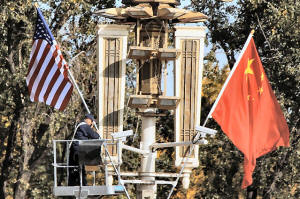|
Much detail, little progress in
U.S.-China talks, sources say
 Send a link to a friend
Send a link to a friend
 [August 25, 2018]
By Michael Martina and David Lawder [August 25, 2018]
By Michael Martina and David Lawder
BEIJING/WASHINGTON (Reuters) - U.S-China
trade talks this week were heavy on details but short on progress as
U.S. negotiators outlined cases of American firms harmed by Chinese
practices and China argued it was meeting its WTO obligations, people
familiar with contents of the discussions said.
The two days of talks in Washington led by mid-level officials did
little to resolve a worsening trade spat between the world's two biggest
economies and ended on Thursday without a joint statement.
Washington separately held hearings during the week on another round of
proposed tariffs on $200 billion worth of Chinese imports that appear
increasingly likely to take effect in late September or early October.
And while factions on the U.S. side have given conflicting signals on
how hard to press Beijing during the trade dispute, officials from the
Treasury Department, which led the talks, and the U.S. Trade
Representative, which has taken a harder line, were aligned in their
messaging, the people said.
The talks took place as the two sides followed through on threatened
tit-for-tat tariffs on $16 billion worth of the other's goods. Beijing
has filed a complaint with the World Trade Organization about the U.S.
duties.
During the talks, Chinese negotiators repeatedly invoked what they said
was Beijing's compliance with WTO rules, an argument that did not
impress the U.S. side.

One of the sources described the U.S. response as: "We're not going to
care about the WTO as you fuel overcapacity, wreck industries and steal
IP (intellectual property). We're not going to sit on our hands."
All of the sources declined to be identified given the sensitivity of
the matter.
Washington is demanding Beijing improve market access and intellectual
property protections for U.S. companies, cut industrial subsidies and
slash a $375 billion trade gap.
In a brief statement on Friday, China's commerce ministry said both
sides had a "constructive" and "candid" exchange over trade issues, and
will stay in touch on the next steps.
U.S. officials, including President Donald Trump, had downplayed
expectations for the talks.
No further talks have been announced.
Chinese negotiators brought up the lack of U.S. market access for items
including Chinese cooked chicken, one of the exports that was agreed
last year as part of a 100-day plan, demonstrating Beijing is still
seeking some U.S. concessions in the talks.
[to top of second column]
|

A worker places U.S. and China flags near the Forbidden City ahead
of a visit by U.S. President Donald Trump to Beijing, in Beijing,
China November 8, 2017. REUTERS/Damir Sagolj/File Photo

"The Chinese are stuck in the mindset that they want something in
return. That's not going to fly in Washington anymore," another
source briefed on the talks said.
U.S. negotiators brought up the case of Micron Technology <MU.O>,
which was temporarily barred by a Chinese court in July from selling
its main semiconductor products in China, citing violation of
patents held by Taiwan's United Microelectronics Corp (UMC)
<2303.TW>.
In December, Micron had filed a civil lawsuit in California accusing
UMC and its state-backed Chinese partner of stealing technology.
One of the people said the talks focused on systemic issues related
to Washington's "Section 301" probe into China's intellectual
property and technology transfer practices.
There was little, if any, focus on more purchases by China of U.S.
commodities. During the previous round of talks, in June in Beijing,
U.S. Commerce Secretary Wilbur Ross unsuccessfully sought to secure
major Chinese purchases of U.S. soybeans and liquefied natural gas.
In an editorial late on Friday, the Global Times, a nationalist
Chinese tabloid run by the ruling Communist Party's People's Daily,
said it was clear that the two days of talks did not yield
significant progress.
"An escalation in the US-China trade war is becoming obvious," it
said, citing U.S. congressional elections in November as a key
reason for the tough U.S. stance.
"So far, neither side shows signs of extending the trade war to
other areas. We hope that both sides can stick to the 'rule' and
keep the trade issue within limits," it said.
(Reporting by Michael Martina in BEIJING and David Lawder in
WASHINGTON; Writing by Tony Munroe; Editing by Lincoln Feast)
[© 2018 Thomson Reuters. All rights
reserved.]
Copyright 2018 Reuters. All rights reserved. This material may not be published,
broadcast, rewritten or redistributed.
Thompson Reuters is solely responsible for this content. |